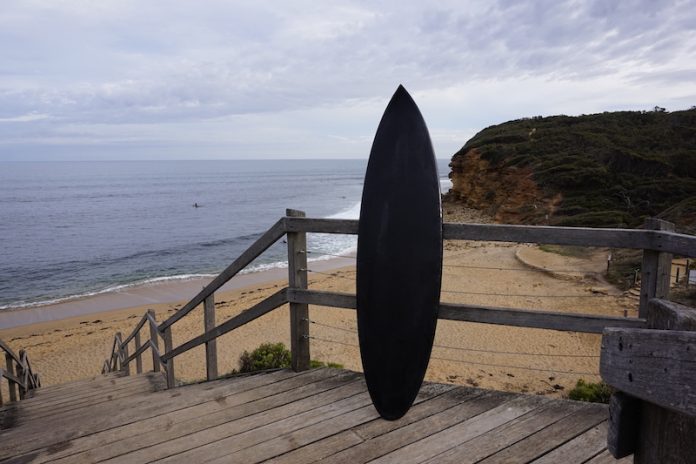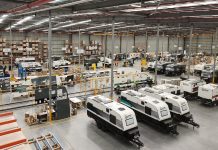
Media Release
Three Deakin graduates have established the world’s first recycled carbon fibre surfboard company, with the help of Deakin University’s SPARK Deakin Accelerator 2020 program.
The group’s Jan Juc startup company, JUC Surf, is set to hit the Australian market with their revolutionary boards made entirely of carbon fibre material that would otherwise be headed for landfill.
Aerospace engineers Dr Filip Stojcevski and Andreas Hendlmeier, along with organic chemist James Randall, combined their advanced knowledge of carbon fibre manufacturing, electrochemistry and material interfaces to overcome the technical hurdles of using recycled carbon fibre to create a robust, affordable, high-performance surfboard.
The trio were inspired by their interactions with world-famous Torquay-based surfboard shaper Eiji Shiomoto.
“While carbon fibre is an amazing material, more than 45,000 tonnes of it is thrown into landfill each year,” Dr Stojcevski said.
“By using the principles of engineering and chemistry we learnt at Deakin, we’ve created surfboards that we’re confident people will love, with the added benefits to the environment in reducing landfill too.
“This is a world-first commercial application of cutting-edge research that highlights the strengths of Geelong’s carbon fibre industry and the Surf Coast community.”
“We’re confident that our boards are stronger, lighter and more durable than conventional e-glass fibre-reinforced boards, but cost around the same price,” Dr Stojcevski said.
“Until now, carbon fibre surfboards have been too rigid and prone to delamination, due to micro-cracks in the carbon fibre interface. We’ve used advanced electrochemistry to improve the properties of surface-modified hydrophobic carbon fibres and recycled fibres to solve the problem.”
Dr Stojcevski completed his Deakin PhD with Boeing R and T Aerospace, where he worked on improving surface treatments that make carbon fibre adhere to resin, while international student Andreas Hendlmeier is from Germany and has worked on optimising carbon fibre surface treatments.
“The SPARK Deakin program has given JUC Surf the chance to purchase all the materials that we need to fast-track surfboard production and grow our company,” Dr Stojcevski said.
“The Australian surfboard industry account for almost a third of the global market, with 8.5 million surfboards in Australia alone.
“We’re hoping to carve out a space for ourselves in this large potential market – and this venture isn’t just limited to surfboards; the technology we’re using could also be adapted for other sporting and marine applications.”
The SPARK Deakin Accelerator program is open to all Deakin staff, students and alumni and is now in its fifth year. JUC Surf is one of five businesses selected as part of the 2020 program.
SPARK Accelerator 2020 startups:
- JUC Surf: Aims to be the world’s first recycled carbon fibre surfboard manufacturer, focusing on creating high performance boards. Founded by Filip Stojcevski, Andreas (Andi) Hendlmeier and James Randall.
- Samytronix: A coding and STEM education platform that provides hardware, training and curriculum design. Founded by Samuel Alexander.
- Lemonade: A platform that creates invite-only experiences that connect hosts, creators and guests. Founded by Arz Bhatia, a Deakin student, previously Design Lead at OnePlus.
- Go Kindly: A social enterprise creating ethically-sourced pillows and bath goods that aims to help tackle homelessness amongst women, with 50 per cent of profits donated to support vulnerable women. Founded by Laura and David Conti.
- One Love Australia: A social change business that aims to educate students about the impact of racism and social exclusion on people’s lives through a range of strategies including school programs, workshops and branded campaigns. Founded by Jamal Elsheikh and Joel Buncle.
SPARK Deakin Program Manager Daizy Maan said the program aimed to build the entrepreneurial capacity of business founders in the early stage of their startups, to help boost their chances of success.
“We have been amazed at the quality of the ideas and follow-through from the entrepreneurs,” Ms Maan said.
“Deakin established this program because we understood the importance of fostering innovation and nurturing the skills needed to create future jobs in an increasingly competitive world.”
Each SPARK Deakin Accelerator startup receives up to $60,000 in value, including $10,000 equity-free funding, regular workshops, co-working space, legal advice, regular mentorships, and access to a network of corporate partners, advisors and experts, all part of a suite of support initiatives.
To learn more about SPARK Deakin, go to this link: https://spark.deakin.edu.au/
Image from Deakin University




















